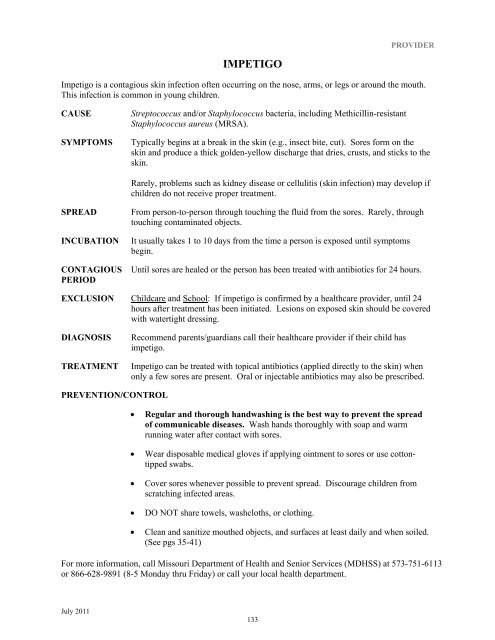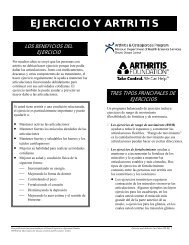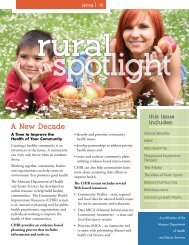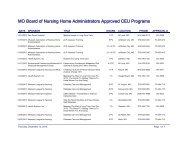Prevention and Control of Communicable Diseases - Missouri ...
Prevention and Control of Communicable Diseases - Missouri ...
Prevention and Control of Communicable Diseases - Missouri ...
You also want an ePaper? Increase the reach of your titles
YUMPU automatically turns print PDFs into web optimized ePapers that Google loves.
July 2011<br />
IMPETIGO<br />
133<br />
PROVIDER<br />
Impetigo is a contagious skin infection <strong>of</strong>ten occurring on the nose, arms, or legs or around the mouth.<br />
This infection is common in young children.<br />
CAUSE Streptococcus <strong>and</strong>/or Staphylococcus bacteria, including Methicillin-resistant<br />
Staphylococcus aureus (MRSA).<br />
SYMPTOMS Typically begins at a break in the skin (e.g., insect bite, cut). Sores form on the<br />
skin <strong>and</strong> produce a thick golden-yellow discharge that dries, crusts, <strong>and</strong> sticks to the<br />
skin.<br />
Rarely, problems such as kidney disease or cellulitis (skin infection) may develop if<br />
children do not receive proper treatment.<br />
SPREAD From person-to-person through touching the fluid from the sores. Rarely, through<br />
touching contaminated objects.<br />
INCUBATION It usually takes 1 to 10 days from the time a person is exposed until symptoms<br />
begin.<br />
CONTAGIOUS<br />
PERIOD<br />
Until sores are healed or the person has been treated with antibiotics for 24 hours.<br />
EXCLUSION Childcare <strong>and</strong> School: If impetigo is confirmed by a healthcare provider, until 24<br />
hours after treatment has been initiated. Lesions on exposed skin should be covered<br />
with watertight dressing.<br />
DIAGNOSIS Recommend parents/guardians call their healthcare provider if their child has<br />
impetigo.<br />
TREATMENT Impetigo can be treated with topical antibiotics (applied directly to the skin) when<br />
only a few sores are present. Oral or injectable antibiotics may also be prescribed.<br />
PREVENTION/CONTROL<br />
� Regular <strong>and</strong> thorough h<strong>and</strong>washing is the best way to prevent the spread<br />
<strong>of</strong> communicable diseases. Wash h<strong>and</strong>s thoroughly with soap <strong>and</strong> warm<br />
running water after contact with sores.<br />
� Wear disposable medical gloves if applying ointment to sores or use cottontipped<br />
swabs.<br />
� Cover sores whenever possible to prevent spread. Discourage children from<br />
scratching infected areas.<br />
� DO NOT share towels, washcloths, or clothing.<br />
� Clean <strong>and</strong> sanitize mouthed objects, <strong>and</strong> surfaces at least daily <strong>and</strong> when soiled.<br />
(See pgs 35-41)<br />
For more information, call <strong>Missouri</strong> Department <strong>of</strong> Health <strong>and</strong> Senior Services (MDHSS) at 573-751-6113<br />
or 866-628-9891 (8-5 Monday thru Friday) or call your local health department.
















